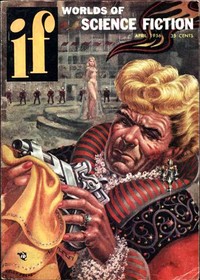Human Error by Raymond F. Jones
"Human Error" by Raymond F. Jones is a science fiction novel likely written in the mid-20th century. The book explores the consequences of human mistakes in the context of advanced space exploration technology. It raises profound questions about human fallibility, the pursuit of perfection, and what it means to be human amid a world increasingly reliant on machines. The story unfolds after a catastrophic accident involving the first space station, known as
the Wheel, which collides with a spaceship due to what is deemed pilot error. As a government investigation proceeds, Captain Frank West emphasizes the inherent dangers of relying solely on human pilots for complex space operations, lamenting the unpredictable nature of human error. In the wake of the tragedy, a new project, dubbed "Project Superman," is launched with the aim of creating a new kind of human—one who can perform tasks flawlessly, akin to a machine. However, as researchers delve deeper into the nature of error and human behavior, they find that the essence of humanity lies in emotional feedback—highlighting that human flaws, including emotions and errors, are fundamental to learning and growth. The climax reveals that the desire for a perfect, errorless man may overlook the critical importance of our emotional complexities, ultimately suggesting that the journey into space—and life itself—requires accepting our imperfection. (This is an automatically generated summary.)
Read or download for free
| How to read | Url | Size | |||
|---|---|---|---|---|---|
| Read now! | https://www.gutenberg.org/ebooks/32403.html.images | 103 kB | |||
| EPUB3 (E-readers incl. Send-to-Kindle) | https://www.gutenberg.org/ebooks/32403.epub3.images | 155 kB | |||
| EPUB (older E-readers) | https://www.gutenberg.org/ebooks/32403.epub.images | 155 kB | |||
| EPUB (no images, older E-readers) | https://www.gutenberg.org/ebooks/32403.epub.noimages | 99 kB | |||
| Kindle | https://www.gutenberg.org/ebooks/32403.kf8.images | 202 kB | |||
| older Kindles | https://www.gutenberg.org/ebooks/32403.kindle.images | 194 kB | |||
| Plain Text UTF-8 | https://www.gutenberg.org/ebooks/32403.txt.utf-8 | 94 kB | |||
| Download HTML (zip) | https://www.gutenberg.org/cache/epub/32403/pg32403-h.zip | 145 kB | |||
| There may be more files related to this item. | |||||
Similar Books
About this eBook
| Author | Jones, Raymond F., 1915-1994 |
|---|---|
| Illustrator | Orban, Paul, 1896-1974 |
| Title | Human Error |
| Series Title | Produced from If Worlds of Science Fiction April 1956. |
| Note | Reading ease score: 74.4 (7th grade). Fairly easy to read. |
| Credits |
Produced by Greg Weeks, Mary Meehan and the Online Distributed Proofreading Team at https://www.pgdp.net |
| Language | English |
| LoC Class | PS: Language and Literatures: American and Canadian literature |
| Subject | Science fiction |
| Category | Text |
| EBook-No. | 32403 |
| Release Date | May 17, 2010 |
| Most Recently Updated | Jan 6, 2021 |
| Copyright Status | Public domain in the USA. |
| Downloads | 195 downloads in the last 30 days. |
| Project Gutenberg eBooks are always free! | |


